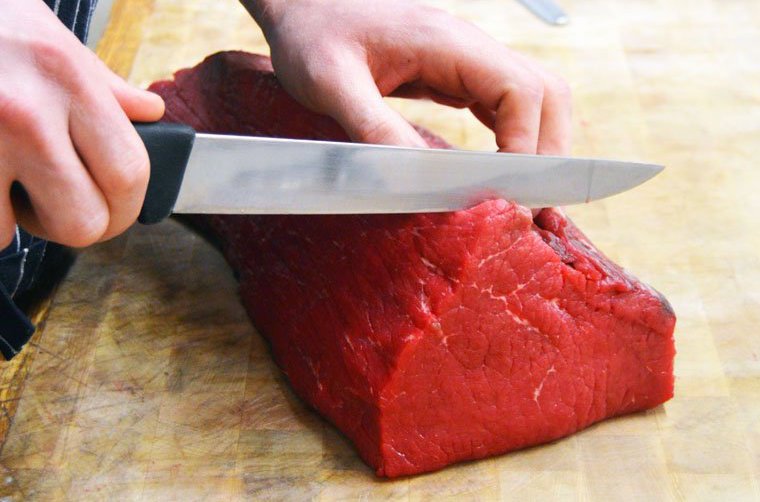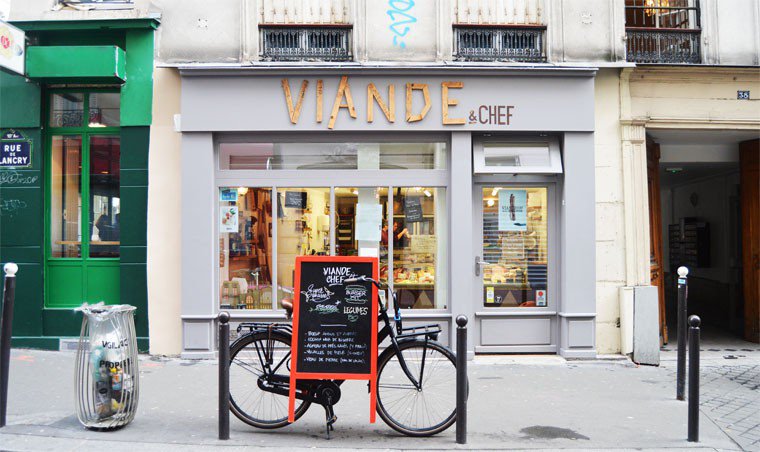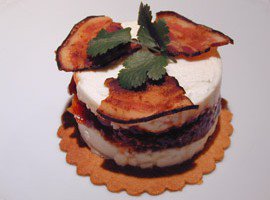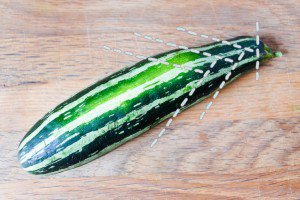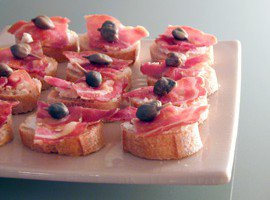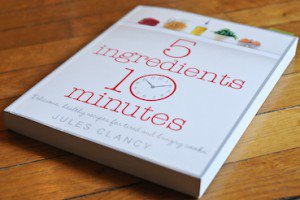The Paris butcher shop is among the most pivotal institutions of any neighborhood’s market street. This is where the savvy shopper goes for the highest-quality meat, freshest prepared foods, and best advice.
Whether it’s a traditional, mom-and-pop boucherie or one of the more sophisticated ones that have opened in recent years (see my top 5 below), the Paris butcher shop does require a little bit of gumption, as you simultaneously try to figure out what’s what, one-up the garçon boucher‘s playful banter, and ignore the little old lady pushing her shopping trolley and sniffly dog up against your ankles.
But I wouldn’t dream of trading this for the anonymous styrofoam trays of the supermarket: I’d rather eat less meat less often, but go for the good stuff with the artisan touch and the traceability.
On that subject, I am thrilled to announce there’s a new sustainable butcher in town. Benjamin Darnaud, a young French chef I’ve been friends with for years, has just opened Viande & Chef in Paris’ 10 arrondissement. He buys whole animals from a select few artisanal farmers, and his talented team comes up with innovative ways to use every last part, rather than supply a disproportionate amount of the more prized cuts. This nose-to-tail approach means they may not have the exact cut you’re looking for that particular day, but they’ll make it up to you tenfold with delicious and quirky stuff. (We thank them for allowing us to take pictures in the shop; photo credit: Anne Elder.)
Without further ado, here are my 6 tips to win at boucherie.
1. Know your cuts (or don’t)
Traditional French butchers sell a wide range of meats: beef, veal, lamb, pork, poultry, rabbit, and game meats in season (from late September to late February). These can be purchased as raw cuts, or ready-to-cook preparations made in-house, such as sausages, stuffed roasts, marinated skewers, seasoned ground meat, breaded patties…
It’s good to have a basic understanding of different cuts and whether they’re the tender kind that should be briefly seared; the tough kind that needs to be cooked low and slow; or the gelatinous kind that will make your stew extra silky. A well-written French recipe (hint hint) will cite examples of cuts that would be a good fit, but substitutions are possible most of the time.
However, even the most experienced French cooks get confused, and have zero qualms about asking their butcher what he recommends for the dish they have in mind. Cue lively discussion on the relative merits of the araignée (“spider”) and the merlan (“whiting”), two prime grilling cuts.
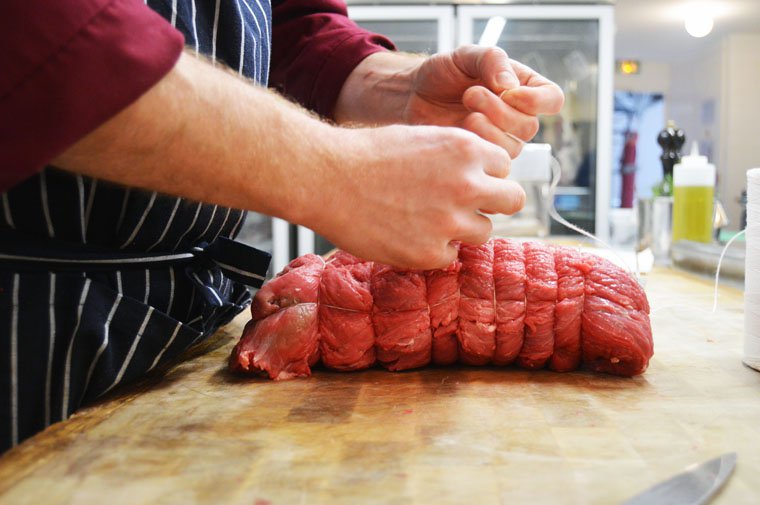
2. Let them do the dirty work
If you’re a little squeamish about handling raw meat, the good news is your butcher will gladly do much of the prep work, not as a favor to you but as an integral part of his job: trim off any extra bits of skin, fat, or connective tissue; empty your bird, cut off its head, singe the last of the feather stubble on its skin, and possibly spatchcock it; pre-cut the chops in a rack of lamb or slice chicken thighs at the joint; score the fat on a duck magret; slice meat for a carpaccio; roll up and tie a roast to your specifications; and even cut meat into cubes of your chosen size for a stew. All that’s left to do then is cook and serve — you won’t even dirty a cutting board!
3. Rely on their expertise
If you’re not sure how much meat is needed to feed your guests, or you’ve never cooked a shoulder of lamb, your butcher will be able to help you. He’ll recommend a typical weight per person depending on the specific cut, and share some simple cooking instructions, perfectly suited for a beginner or as a refresher.
And because most of the preparations are done in-house, you can ask about the flavor or the ingredients (especially if you have allergies or other dietary issues), and how long they’ll keep.
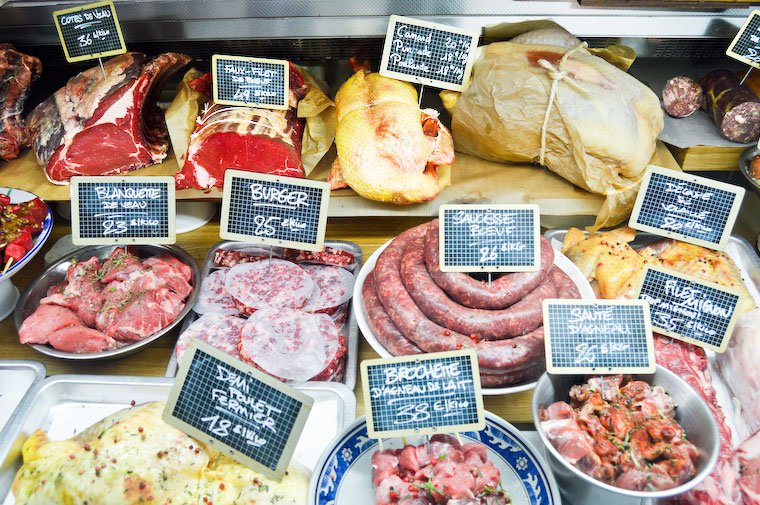
4. Call ahead
If you have something specific in mind, be sure to call a couple of days in advance and place your order. This is especially true of prized or rare cuts, such as beef cheeks and offals; if you’re hoping to roast a whole turkey for Thanksgiving (a bird that no French butcher has readily available); if you want ground meat that isn’t beef (a butcher typically has a single meat grinder devoted to beef, and food safety regulations require him to disassemble and clean it entirely when switching meats, so he’ll do it outside business hours); to reserve a rôtisserie chicken for lunch on a Sunday (it’s fine to call the morning of).
When in doubt, call: you’ll save time because your order will be ready for pickup, and having your boucher on speed dial places you firmly in the “seasoned French cook” category.
5. Don’t overlook the rest of the range, but think twice about impulse purchases
In addition to raw meat, traditional French butchers sell charcuterie: cooked or cured ham (jambon blanc or jambon cru), dried sausages (fat saucissons and slim saucisses sèches), bacon (poitrine fumée or ventrèche), various kinds of pâtés and terrines, and miscellaneous specialties depending on their region of origin or preference. Some they will make themselves (usually the cooked ham and terrines), others they will buy from other artisans. Ask to find out which it is.
If you want to make the boucherie a one-stop shop to prepare your meal, consider the house-made salads (typically grated carrots and grated celeriac or céleri rémoulade) or the potatoes that have cooked in the rôtisserie chicken drippings. They are definitely more expensive by weight than anything you would make yourself, but such is the price of convenience.
However, if you’re tempted by the fine foods displayed on the open shelves — mustards and preserved vegetables and the world’s most expensive potato chips — triple-check the prices.
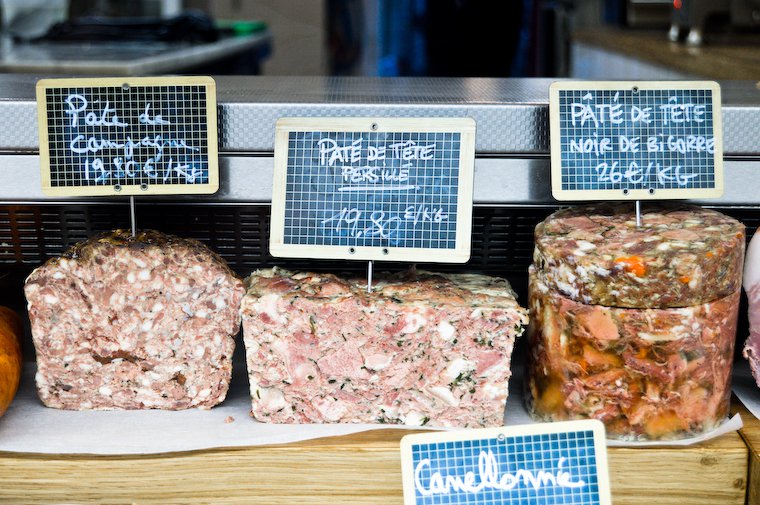
6. Eat or freeze
Buying meat from a good butcher shop ensures optimal freshness, but as with produce and cheese, you should plan to eat your purchases within a couple of days, three at the most (one day tops for offal meats), based on your butcher’s advice.
If it looks like that’s not going to happen, or you only take an occasional trip out to that special organic butcher you like, double-wrap your meat (some butchers can vacuum-pack it for you) and freeze for longer storage — but no more than 2 to 3 months to preserve flavor and texture.
Paris Butcher Shop: 10 Useful Phrases
- “Je voudrais faire un boeuf bourguignon avec un mélange de morceaux. Qu’est-ce que vous me recommandez ?”
“I want to make a beef bourguignon with a combination of cuts. What can you recommend?” - “Vous pourrez me couper la viande en cubes ?”
“Will you cube the meat for me?” - “C’est combien le kilo ?”
“How much is it per kilo?” - “Comment vous me conseillez de les cuisiner, les paupiettes ?”
“How should I cook the paupiettes (stuffed bundles of veal) ?” - “Je voudrais des merguez pour six personnes.”
“I would like merguez sausages for six.” - “C’est vous qui le faites, le pâté de tête ?”
“Is the headcheese housemade?” - “C’est du porc fermier ?”
“Is the pork farm-raised?” - “Je voudrais six tranches de jambon blanc bien fines.”
“I’d like six slices of cooked ham, nice and thin.” - “Combien de temps je peux garder le rôti au frigo ?”
“How long will the roast keep in the fridge?” - “Je suis allergique au cumin. Il y en a dans la marinade ?”
“I’m allergic to cumin. Is there any in the marinade?”
Clotilde’s Top 5 Paris Butcher Shops
- Viande & Chef: Benjamin Darnaud’s sustainable butcher shop.
- Terroirs d’Avenir: The cream of the crop of ingredients sold from four tiny shops, including one excellent butchery counter.
- Marché des Batignolles: This organic greenmarket is held on Saturday mornings, and houses several stands held by meat farmers.
- Maison Plisson: This fine foods store has a gorgeous meat counter with a team of butchers who operate on the premises.
- Boucherie Sautereau / Le Bourdonnec: Yves-Marie Le Bourdonnec is known for the aging techniques he applies to top-quality, well-bred meats. He has several shops but this is the one I frequent, run by one of his disciples.
You’ll find them on their own layer on my Paris map!
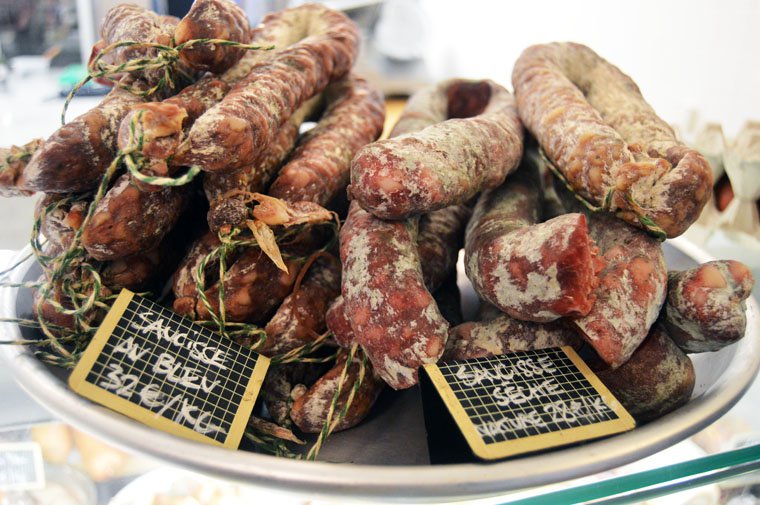
Planning a trip to Paris?
As a born-and-raised Parisian and a passionate eater, I am available to take you on a private walking tour to show you some of my favorite spots, and share my best tips and advice on how to navigate the Paris food scene. I also offer customized itineraries so you can make the most of your time in the city without wasting a single bite on sub-par eats. Please get in touch and I will be happy to provide more details and a quote!
Join the conversation!
Have you ever purchased meat from a French boucherie? What was your experience like? And are you able to find quality, artisan meat where you live? Any pressing question about French meat-buying practices? I’ll do my best to answer!
